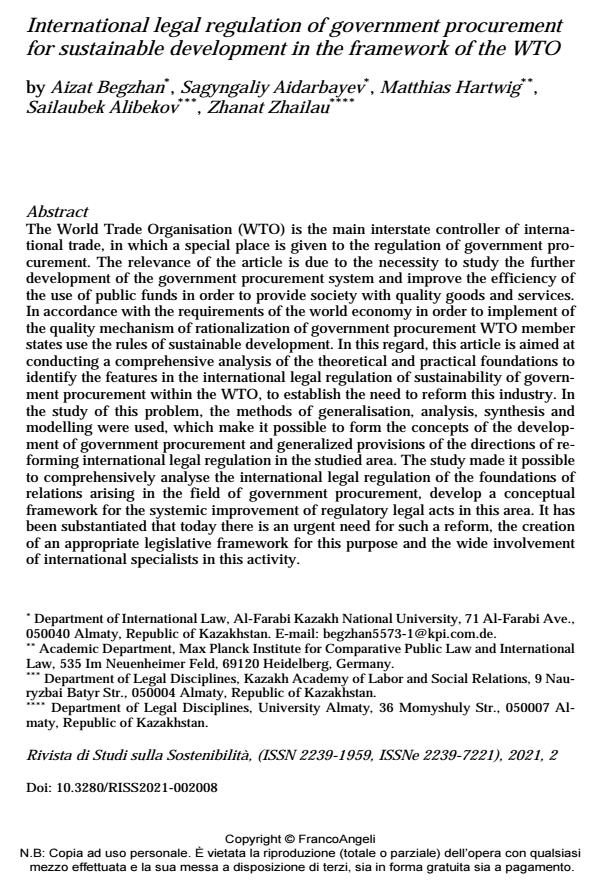International legal regulation of government procurement for sustainable development in the framework of the WTO
Titolo Rivista RIVISTA DI STUDI SULLA SOSTENIBILITA'
Autori/Curatori Aizat Begzhan, Sagyngaliy Aidarbayev, Matthias Hartwig, Sailaubek Alibekov, Zhanat Zhailau
Anno di pubblicazione 2022 Fascicolo 2021/2
Lingua Inglese Numero pagine 15 P. 95-109 Dimensione file 117 KB
DOI 10.3280/RISS2021-002008
Il DOI è il codice a barre della proprietà intellettuale: per saperne di più
clicca qui
Qui sotto puoi vedere in anteprima la prima pagina di questo articolo.
Se questo articolo ti interessa, lo puoi acquistare (e scaricare in formato pdf) seguendo le facili indicazioni per acquistare il download credit. Acquista Download Credits per scaricare questo Articolo in formato PDF

FrancoAngeli è membro della Publishers International Linking Association, Inc (PILA), associazione indipendente e non profit per facilitare (attraverso i servizi tecnologici implementati da CrossRef.org) l’accesso degli studiosi ai contenuti digitali nelle pubblicazioni professionali e scientifiche.
The World Trade Organisation (WTO) is the main interstate controller of international trade, in which a special place is given to the regulation of government procurement. The relevance of the article is due to the necessity to study the further development of the government procurement system and improve the efficiency of the use of public funds in order to provide society with quality goods and services. In accordance with the requirements of the world economy in order to implement of the quality mechanism of rationalization of government procurement WTO member states use the rules of sustainable development. In this regard, this article is aimed at conducting a comprehensive analysis of the theoretical and practical foundations to identify the features in the international legal regulation of sustainability of government procurement within the WTO, to establish the need to reform this industry. In the study of this problem, the methods of generalisation, analysis, synthesis and modelling were used, which make it possible to form the concepts of the development of government procurement and generalized provisions of the directions of reforming international legal regulation in the studied area. The study made it possible to comprehensively analyse the international legal regulation of the foundations of relations arising in the field of government procurement, develop a conceptual framework for the systemic improvement of regulatory legal acts in this area. It has been substantiated that today there is an urgent need for such a reform, the creation of an appropriate legislative framework for this purpose and the wide involvement of international specialists in this activity.
Parole chiave:WTO, international trade, government procurement, reforming international legislation, trade policy of states.
- Theoretical aspects of improvement of society-business-government cooperation in the context of European integration Anna Stychynska, Alla Kravchenko, Olena Krasilnikova, Natalia Husieva, Iryna Kyzymenko, in Social Legal Studios /2024 pp.243
DOI: 10.32518/sals1.2024.243 - National customs legislation adaptation to EU requirements in the context of eastern partnership policy development Teimuraz Sartania, in Social Legal Studios /2024 pp.56
DOI: 10.32518/sals1.2024.56
Aizat Begzhan, Sagyngaliy Aidarbayev, Matthias Hartwig, Sailaubek Alibekov, Zhanat Zhailau, International legal regulation of government procurement for sustainable development in the framework of the WTO in "RIVISTA DI STUDI SULLA SOSTENIBILITA'" 2/2021, pp 95-109, DOI: 10.3280/RISS2021-002008